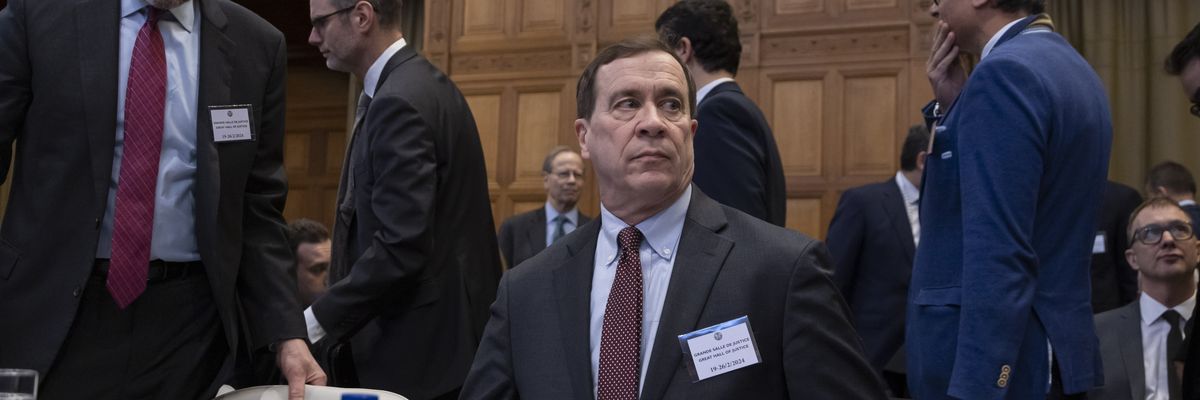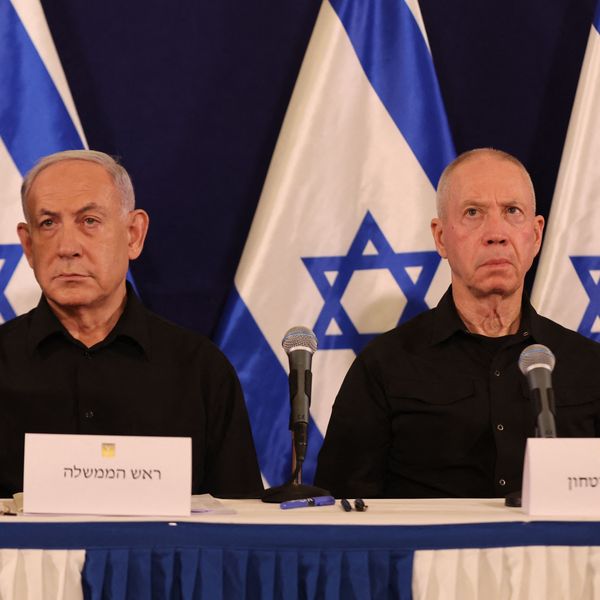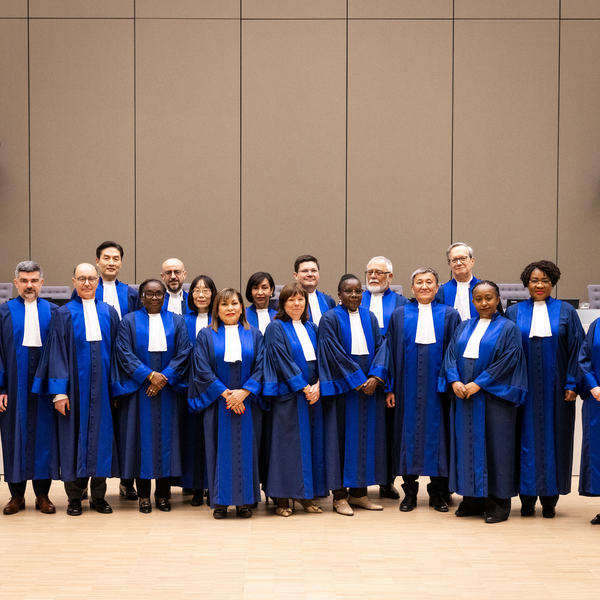
Richard C. Visek, acting legal adviser for the United States Department of State, attends a hearing at the International Court of Justice on Israel's practices in the Palestinian territories in The Hague, Netherlands on February 21, 2024.
US, UK, Fiji, and Hungary Only Nations to Defend Israeli Occupation at ICJ
One analyst argued that opponents of Israel's occupation "demolished" the arguments of its few supporters.
In what one policy expert said was a "stunning" display of Israel and its allies' isolation on the world stage, six days of International Court of Justice hearings on the Israeli occupation of Palestinian territories wrapped up on Monday with just four countries defending Israel's practices in Gaza, the West Bank, and East Jerusalem over the past 57 years.
The United States—the world's biggest funder of Israel's government and military—was joined by the United Kingdom, Hungary, and Fiji in speaking in favor of Israel's illegal occupation, while 45 countries and three organizations testified against the Israeli government.
The hearings took place against the backdrop of Israel's relentless bombardment of Gaza, which has killed at least 29,878 Palestinians, and an announcement by Israeli Finance Minister Bezalel Smotrich that the country plans to build 3,300 new homes in settlements in the West Bank.
While U.S. Secretary of State Antony Blinken said last week that the settlement expansion is "inconsistent with international law," reversing a Trump-era policy, human rights attorney Noura Erakat noted that in the ICJ hearing, the U.S. "framed compliance with international law as an impediment to [the] political process."
Richard Visek, the State Department's acting legal adviser, invoked the Hamas-led attack on southern Israel on October 7 as he argued before the court that it "should not find that Israel is legally obligated to immediately and unconditionally withdraw from occupied territory."
"Any movement towards Israel's withdrawal from the West Bank and Gaza requires consideration of Israel's very real security needs," said Visek. "We were all reminded of those security needs on October 7, and they persist."
But the vast majority of states present for the hearings rebuked Visek's claim, with Turkey's deputy minister of foreign affairs, Ahmet Yildiz, arguing that "the real obstacle to peace is obvious—the deepening occupation by Israel of the Palestinian territories, including East Jerusalem, and failure to implement the two-state vision, Israel and Palestine living side by side."
Representing the African Union, Ohio State University law professor Mohamed Helal provided the court with an overview of the Palestinian territories' history of occupation to answer the question, "Does Israel have title over the West Bank, Gaza, and East Jerusalem?"
"The answer is unequivocally no," said Helal. "Since 1967, Israel has exercised belligerent occupation over the West Bank, Gaza, and East Jerusalem. The African Union also submits that Israel's 57-year occupation of the Palestinian territories is unlawful and must be brought to an end."
Legal experts including Helal spent six days testifying on the occupation Israel has maintained over the territories since the Six-Day War in 1967, including its construction of settlements inhabited by 700,000 settlers in the West Bank, its annexation of East Jerusalem, its blockade of goods in Gaza, and its restriction of Palestinians' movement.
Speaking for the League of Arab States on the closing day of the hearings on Monday, international law expert Ralph Wilde of University College London delivered what observers called "a legal masterpiece," explaining to the ICJ the illegality of Israel's occupation.
According to Israel and its allies, said Wilde, the desire for Israel to protect its security "somehow supersedes the rules of international law determining whether the occupation is existentially lawful. Instead, we have a new rule justifying the occupation until there is a peace agreement meeting Israeli security needs."
"This is the law as these states would like it to be, not not the law as it is," he continued, saying the occupation has no basis in U.N. Security Council Resolution 242, which called on Israel to withdraw its troops from the occupied territories in 1967, or the 1993 Oslo Accords.
"Actually," he told the court, "you are being invited to do away with the very operation of some of the fundamental... laws of international law itself."
Al Jazeera political analyst Marwan Bishara said the evidence presented by opponents of the occupation "demolished British and American arguments" in the hearings.
"I'm going to say something I will regret, but I'll say it anyway—I feel sorry for the United States and the United Kingdom," said Bishara after watching the proceedings. In the first days of the hearing, he said, "it was clear to someone like me, a student of this issue, that the Americans and the British wanted to sound clever... That they were disingenuous and selective, and rather, to my mind, illogical."
The U.S. and U.K. led Israel's supporters at the hearing in falsely claiming that the conflict in Israel and Palestine is merely a "dispute," said Bishara, that should be left up to the two sides, despite the fact that the two countries provide Israel with aid.
"This is an aggression," he said. "As the African Union, as the Arab League, as well as the Islamic conference have argued, this has been going on for 75 years. There is a process, there is a pattern by Israel to annex, to occupy, to settle, and to take over Palestinian territory, denying the Palestinians the right of self-determination."
An Urgent Message From Our Co-Founder
Dear Common Dreams reader, The U.S. is on a fast track to authoritarianism like nothing I've ever seen. Meanwhile, corporate news outlets are utterly capitulating to Trump, twisting their coverage to avoid drawing his ire while lining up to stuff cash in his pockets. That's why I believe that Common Dreams is doing the best and most consequential reporting that we've ever done. Our small but mighty team is a progressive reporting powerhouse, covering the news every day that the corporate media never will. Our mission has always been simple: To inform. To inspire. And to ignite change for the common good. Now here's the key piece that I want all our readers to understand: None of this would be possible without your financial support. That's not just some fundraising cliche. It's the absolute and literal truth. We don't accept corporate advertising and never will. We don't have a paywall because we don't think people should be blocked from critical news based on their ability to pay. Everything we do is funded by the donations of readers like you. Will you donate now to help power the nonprofit, independent reporting of Common Dreams? Thank you for being a vital member of our community. Together, we can keep independent journalism alive when it’s needed most. - Craig Brown, Co-founder |
In what one policy expert said was a "stunning" display of Israel and its allies' isolation on the world stage, six days of International Court of Justice hearings on the Israeli occupation of Palestinian territories wrapped up on Monday with just four countries defending Israel's practices in Gaza, the West Bank, and East Jerusalem over the past 57 years.
The United States—the world's biggest funder of Israel's government and military—was joined by the United Kingdom, Hungary, and Fiji in speaking in favor of Israel's illegal occupation, while 45 countries and three organizations testified against the Israeli government.
The hearings took place against the backdrop of Israel's relentless bombardment of Gaza, which has killed at least 29,878 Palestinians, and an announcement by Israeli Finance Minister Bezalel Smotrich that the country plans to build 3,300 new homes in settlements in the West Bank.
While U.S. Secretary of State Antony Blinken said last week that the settlement expansion is "inconsistent with international law," reversing a Trump-era policy, human rights attorney Noura Erakat noted that in the ICJ hearing, the U.S. "framed compliance with international law as an impediment to [the] political process."
Richard Visek, the State Department's acting legal adviser, invoked the Hamas-led attack on southern Israel on October 7 as he argued before the court that it "should not find that Israel is legally obligated to immediately and unconditionally withdraw from occupied territory."
"Any movement towards Israel's withdrawal from the West Bank and Gaza requires consideration of Israel's very real security needs," said Visek. "We were all reminded of those security needs on October 7, and they persist."
But the vast majority of states present for the hearings rebuked Visek's claim, with Turkey's deputy minister of foreign affairs, Ahmet Yildiz, arguing that "the real obstacle to peace is obvious—the deepening occupation by Israel of the Palestinian territories, including East Jerusalem, and failure to implement the two-state vision, Israel and Palestine living side by side."
Representing the African Union, Ohio State University law professor Mohamed Helal provided the court with an overview of the Palestinian territories' history of occupation to answer the question, "Does Israel have title over the West Bank, Gaza, and East Jerusalem?"
"The answer is unequivocally no," said Helal. "Since 1967, Israel has exercised belligerent occupation over the West Bank, Gaza, and East Jerusalem. The African Union also submits that Israel's 57-year occupation of the Palestinian territories is unlawful and must be brought to an end."
Legal experts including Helal spent six days testifying on the occupation Israel has maintained over the territories since the Six-Day War in 1967, including its construction of settlements inhabited by 700,000 settlers in the West Bank, its annexation of East Jerusalem, its blockade of goods in Gaza, and its restriction of Palestinians' movement.
Speaking for the League of Arab States on the closing day of the hearings on Monday, international law expert Ralph Wilde of University College London delivered what observers called "a legal masterpiece," explaining to the ICJ the illegality of Israel's occupation.
According to Israel and its allies, said Wilde, the desire for Israel to protect its security "somehow supersedes the rules of international law determining whether the occupation is existentially lawful. Instead, we have a new rule justifying the occupation until there is a peace agreement meeting Israeli security needs."
"This is the law as these states would like it to be, not not the law as it is," he continued, saying the occupation has no basis in U.N. Security Council Resolution 242, which called on Israel to withdraw its troops from the occupied territories in 1967, or the 1993 Oslo Accords.
"Actually," he told the court, "you are being invited to do away with the very operation of some of the fundamental... laws of international law itself."
Al Jazeera political analyst Marwan Bishara said the evidence presented by opponents of the occupation "demolished British and American arguments" in the hearings.
"I'm going to say something I will regret, but I'll say it anyway—I feel sorry for the United States and the United Kingdom," said Bishara after watching the proceedings. In the first days of the hearing, he said, "it was clear to someone like me, a student of this issue, that the Americans and the British wanted to sound clever... That they were disingenuous and selective, and rather, to my mind, illogical."
The U.S. and U.K. led Israel's supporters at the hearing in falsely claiming that the conflict in Israel and Palestine is merely a "dispute," said Bishara, that should be left up to the two sides, despite the fact that the two countries provide Israel with aid.
"This is an aggression," he said. "As the African Union, as the Arab League, as well as the Islamic conference have argued, this has been going on for 75 years. There is a process, there is a pattern by Israel to annex, to occupy, to settle, and to take over Palestinian territory, denying the Palestinians the right of self-determination."
- As World Awaits Friday's ICJ Verdict, Israeli Pounding of Gaza Civilians Continues ›
- South Africa's Genocide Presentation Against Israel Called 'Overwhelming and Devastating' ›
- 'Scandal': Israeli Dossier 'Provides No Evidence' for Claims Against UNRWA Staff ›
- Opinion | Why the ICJ Ruling on Israel’s Occupation of Palestine Matters | Common Dreams ›
- UK Ministers at Risk of Liability for Supporting Israeli War Crimes: Legal Expert | Common Dreams ›
In what one policy expert said was a "stunning" display of Israel and its allies' isolation on the world stage, six days of International Court of Justice hearings on the Israeli occupation of Palestinian territories wrapped up on Monday with just four countries defending Israel's practices in Gaza, the West Bank, and East Jerusalem over the past 57 years.
The United States—the world's biggest funder of Israel's government and military—was joined by the United Kingdom, Hungary, and Fiji in speaking in favor of Israel's illegal occupation, while 45 countries and three organizations testified against the Israeli government.
The hearings took place against the backdrop of Israel's relentless bombardment of Gaza, which has killed at least 29,878 Palestinians, and an announcement by Israeli Finance Minister Bezalel Smotrich that the country plans to build 3,300 new homes in settlements in the West Bank.
While U.S. Secretary of State Antony Blinken said last week that the settlement expansion is "inconsistent with international law," reversing a Trump-era policy, human rights attorney Noura Erakat noted that in the ICJ hearing, the U.S. "framed compliance with international law as an impediment to [the] political process."
Richard Visek, the State Department's acting legal adviser, invoked the Hamas-led attack on southern Israel on October 7 as he argued before the court that it "should not find that Israel is legally obligated to immediately and unconditionally withdraw from occupied territory."
"Any movement towards Israel's withdrawal from the West Bank and Gaza requires consideration of Israel's very real security needs," said Visek. "We were all reminded of those security needs on October 7, and they persist."
But the vast majority of states present for the hearings rebuked Visek's claim, with Turkey's deputy minister of foreign affairs, Ahmet Yildiz, arguing that "the real obstacle to peace is obvious—the deepening occupation by Israel of the Palestinian territories, including East Jerusalem, and failure to implement the two-state vision, Israel and Palestine living side by side."
Representing the African Union, Ohio State University law professor Mohamed Helal provided the court with an overview of the Palestinian territories' history of occupation to answer the question, "Does Israel have title over the West Bank, Gaza, and East Jerusalem?"
"The answer is unequivocally no," said Helal. "Since 1967, Israel has exercised belligerent occupation over the West Bank, Gaza, and East Jerusalem. The African Union also submits that Israel's 57-year occupation of the Palestinian territories is unlawful and must be brought to an end."
Legal experts including Helal spent six days testifying on the occupation Israel has maintained over the territories since the Six-Day War in 1967, including its construction of settlements inhabited by 700,000 settlers in the West Bank, its annexation of East Jerusalem, its blockade of goods in Gaza, and its restriction of Palestinians' movement.
Speaking for the League of Arab States on the closing day of the hearings on Monday, international law expert Ralph Wilde of University College London delivered what observers called "a legal masterpiece," explaining to the ICJ the illegality of Israel's occupation.
According to Israel and its allies, said Wilde, the desire for Israel to protect its security "somehow supersedes the rules of international law determining whether the occupation is existentially lawful. Instead, we have a new rule justifying the occupation until there is a peace agreement meeting Israeli security needs."
"This is the law as these states would like it to be, not not the law as it is," he continued, saying the occupation has no basis in U.N. Security Council Resolution 242, which called on Israel to withdraw its troops from the occupied territories in 1967, or the 1993 Oslo Accords.
"Actually," he told the court, "you are being invited to do away with the very operation of some of the fundamental... laws of international law itself."
Al Jazeera political analyst Marwan Bishara said the evidence presented by opponents of the occupation "demolished British and American arguments" in the hearings.
"I'm going to say something I will regret, but I'll say it anyway—I feel sorry for the United States and the United Kingdom," said Bishara after watching the proceedings. In the first days of the hearing, he said, "it was clear to someone like me, a student of this issue, that the Americans and the British wanted to sound clever... That they were disingenuous and selective, and rather, to my mind, illogical."
The U.S. and U.K. led Israel's supporters at the hearing in falsely claiming that the conflict in Israel and Palestine is merely a "dispute," said Bishara, that should be left up to the two sides, despite the fact that the two countries provide Israel with aid.
"This is an aggression," he said. "As the African Union, as the Arab League, as well as the Islamic conference have argued, this has been going on for 75 years. There is a process, there is a pattern by Israel to annex, to occupy, to settle, and to take over Palestinian territory, denying the Palestinians the right of self-determination."
- As World Awaits Friday's ICJ Verdict, Israeli Pounding of Gaza Civilians Continues ›
- South Africa's Genocide Presentation Against Israel Called 'Overwhelming and Devastating' ›
- 'Scandal': Israeli Dossier 'Provides No Evidence' for Claims Against UNRWA Staff ›
- Opinion | Why the ICJ Ruling on Israel’s Occupation of Palestine Matters | Common Dreams ›
- UK Ministers at Risk of Liability for Supporting Israeli War Crimes: Legal Expert | Common Dreams ›

